Erectile dysfunction medications like Viagra and Cialis are widely used and have helped millions of men regain sexual confidence. These drugs work by improving blood flow to the penis, but they can sometimes cause side effects. One of the most common issues is headache, which occurs when blood vessels widen and nitric oxide levels rise in the brain. Headaches are among the most frequently reported side effects of sildenafil and tadalafil, according to the U.S. Food and Drug Administration. Headaches occur in approximately 6-8% of users taking daily tadalafil 5mg, compared to 10-16% taking on-demand doses of 10-20mg. This represents a clinically significant 3-5 fold reduction in headache incidence with daily dosing regimens as reported by the International Journal of Clinical Practice. This significant difference in headache incidence between daily and on-demand tadalafil dosing is attributed to steady-state plasma levels achieved with daily dosing. This avoids the peak concentration spikes associated with on-demand use that trigger vascular headaches
Most headaches are mild and last only a few hours, though migraine-like or tension-type headaches can persist longer. Remedies include lowering the dose, staying hydrated, or using over-the-counter pain relievers such as ibuprofen. Beyond headaches, reported side effects include flushing, nasal congestion, indigestion, and in rare cases, vision or hearing changes. This article highlights the causes of headaches from Viagra and Cialis, how long they last, possible remedies, and ways to prevent them.
How ED Medications Work
Erectile dysfunction drugs like Viagra, Cialis, and Levitra work by blocking an enzyme called PDE5. This enzyme breaks down a chemical messenger called cGMP. cGMP relaxes blood vessels in the penis and allows more blood to flow in. When PDE5 is blocked, cGMP stays active longer. This keeps the vessels relaxed and makes erections easier to achieve and maintain. These drugs do not create an erection on their own. They only help the natural process that starts with sexual arousal. Viagra, made with sildenafil, begins to work in 30 to 60 minutes and lasts about 4 hours. Cialis, made with tadalafil, takes 30 to 120 minutes to work and can last up to 36 hours. Levitra, made with vardenafil, works in about 25 to 30 minutes and lasts 4 to 5 hours. Food slows Viagra more than it slows Levitra, and some men find Levitra causes fewer visual problems. The right choice depends on how quickly you want it to work, how long you need it to last, and how your body reacts. PDE5 inhibitors are the first treatment doctors use because they act directly on the pathway that controls blood flow in the penis.
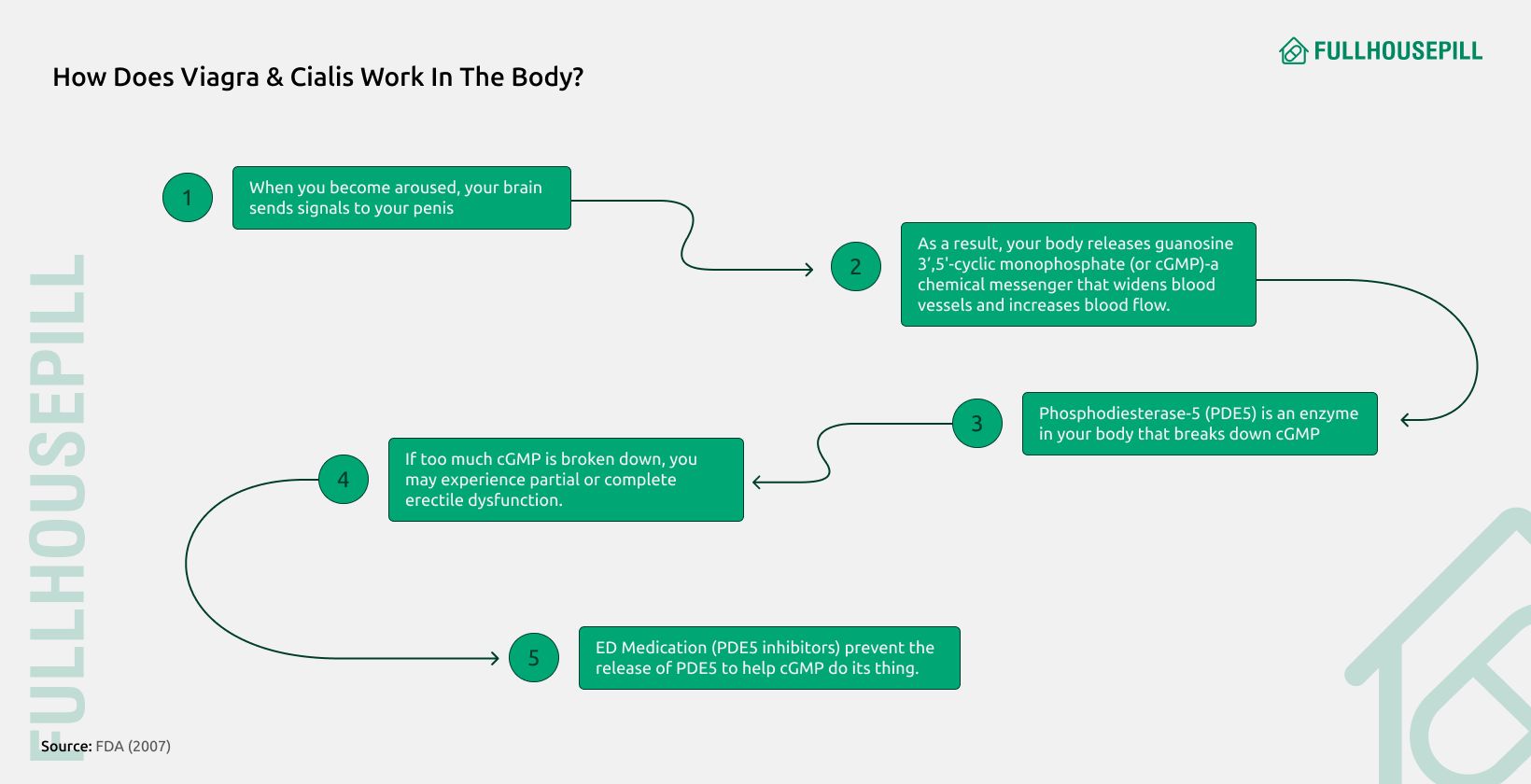
| Medication | Onset of Action | Duration of Effect | Special Notes |
| Viagra (Sildenafil) | Starts working in 30-60 minutes | Lasts about 4 hours | Works best on an empty stomach for a faster effect |
| Cialis (Tadalafil) | Takes effect in about 30-120 minutes | Can last up to 36 hours | Nicknamed the “weekend pill”. Also available in daily low doses, which may help men with BPH (benign prostatic hyperplasia) |
| Levitra (Vardenafil) | Starts working in 25-30 minutes | Lasts around 4-5 hours | Less affected by food. Some men report fewer visual side effects compared to Viagra. |
PDE5 inhibitors are the first-line treatment for erectile dysfunction because they target the exact biological pathway that controls blood flow in the penis, according to the American Urological Association. These drugs are also used for other health conditions. Sildenafil and tadalafil are FDA-approved for pulmonary arterial hypertension, where they help relax blood vessels in the lungs. Tadalafil is also approved for BPH, easing urinary symptoms in men with enlarged prostates.
Why Do Viagra and Cialis Cause Headaches?
Viagra and Cialis cause headaches because they relax and widen blood vessels in the brain, not just in the penis. This sudden change in blood flow and vessel pressure activates pain pathways that trigger a headache. These medications belong to a group called PDE5 inhibitors. Their purpose is to block the enzyme phosphodiesterase type 5, which helps maintain higher levels of cGMP. According to the National Institutes of Health, cGMP relaxes smooth muscles and widens blood vessels. While this effect is useful in the penis for creating erections, the same mechanism also happens in other blood vessels, including those in the head.
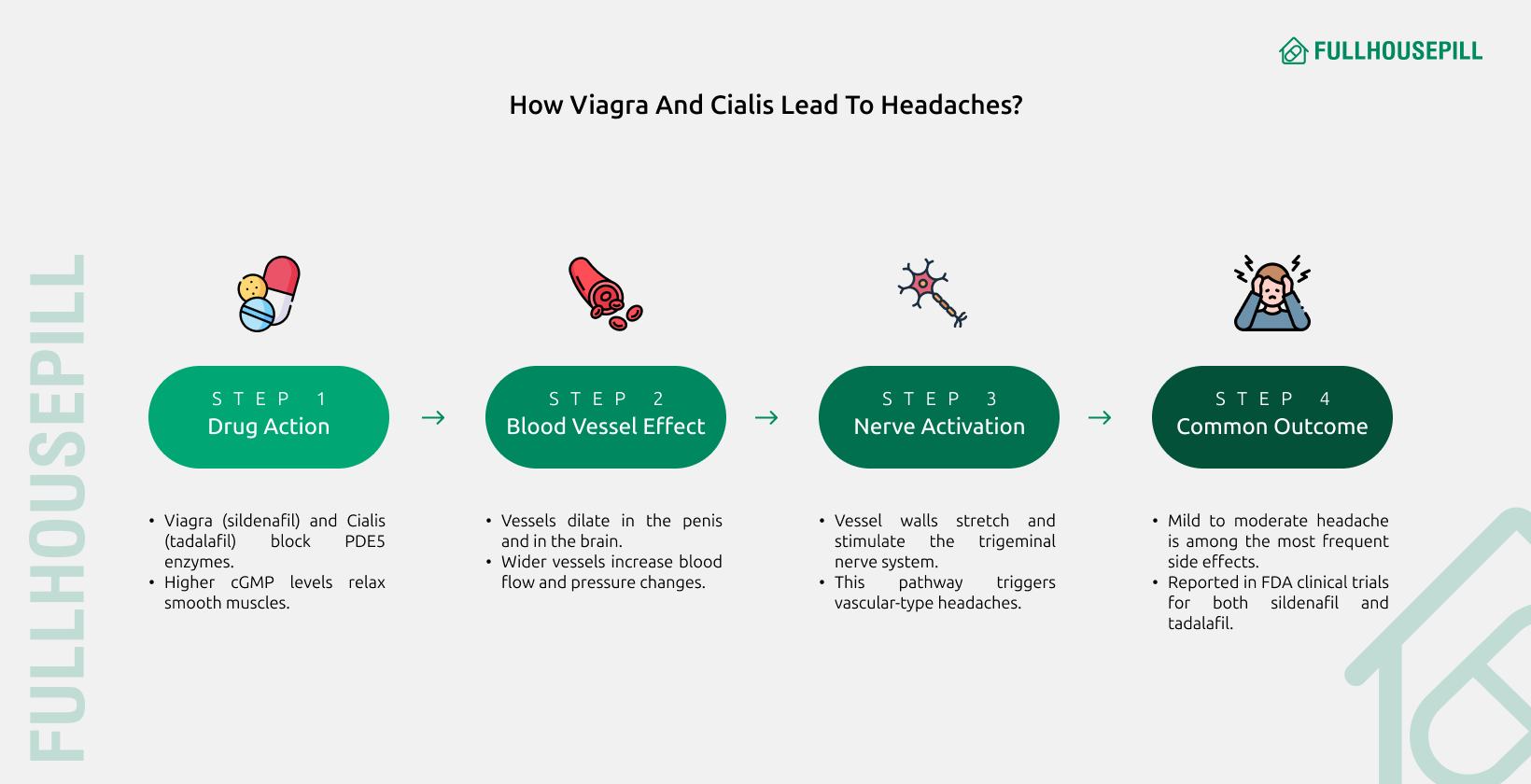
When vessels in the brain dilate, nerve endings in the vessel walls become sensitive. This stretching effect stimulates the trigeminal nerve system, a known pain pathway that often causes vascular headaches. This vascular dilation is the primary reason why men develop headaches after taking sildenafil or tadalafil, as noted by The Journal of Headache and Pain (2015). Headaches are not rare with these drugs. They are one of the most frequently reported side effects in clinical trials for both sildenafil and tadalafil, according to the U.S. Food and Drug Administration. The Cialis label was updated for the BPH indication in October 2011.
Severe headaches during sexual activity can signal a serious medical emergency and should never be ignored. According to the International Classification of Headache Disorders (ICHD-3), the first time such a headache occurs, doctors must rule out life-threatening conditions like subarachnoid haemorrhage (SAH). SAH is bleeding into the space surrounding the brain, often caused by a ruptured aneurysm. It can be rapidly fatal if untreated. Arterial dissections can also occur when a tear forms in the wall of an artery, which can block blood flow or cause a stroke. It may also cause Reversible cerebral vasoconstriction syndrome (RCVS) involves sudden narrowing of the brain’s blood vessels, leading to severe, recurrent headaches. Sudden, intense headaches linked to sexual activity may indicate dangerous vascular problems, making prompt medical evaluation essential, as reported by Ziu et al (2023). Experiencing this type of headache means immediate attention is crucial to ensure accurate diagnosis and proper treatment.
Not every headache feels the same. Some men experience a mild throbbing that fades in a few hours, while others describe cluster-like headaches that return for several days. The severity depends on nitric oxide release and the sensitivity of the blood vessels in the central nervous system, according to The Lancet Neurology. Men who already suffer from migraines or tension headaches may be more likely to experience stronger pain when taking ED drugs.
How Common Are ED Medication Headaches?
Headaches are the most frequently reported side effect of erectile dysfunction drugs like Viagra, Cialis, and Levitra. he risk of experiencing headaches with Viagra appears to be dose-dependent. Incidence of headaches with sildenafil does not follow a simple dose-response relationship. In fixed-dose trials, headaches occurred in 14.4% of participants at 50 mg compared with 12.2% at 100 mg. In flexible-dose trials, the rates were 12.8% at 50 mg and 8.8% at 100 mg. Tadalafil headache rates demonstrate a dramatic difference between dosing regimens. Daily dosing (2.5-5 mg) produces headaches in approximately 3-8% of users, while on-demand dosing (10-20 mg) results in headache rates of 10-17%. Meta-analyses confirm that daily tadalafil produces 3-5 times fewer headaches than on-demand dosing due to steady-state plasma levels that avoid the peak concentration spikes associated with on-demand use that trigger vascular headaches. Headache patterns with PDE5 inhibitors are more complex than simple dose-response relationships, particularly in flexible-dose studies where patient selection effects influence outcomes.
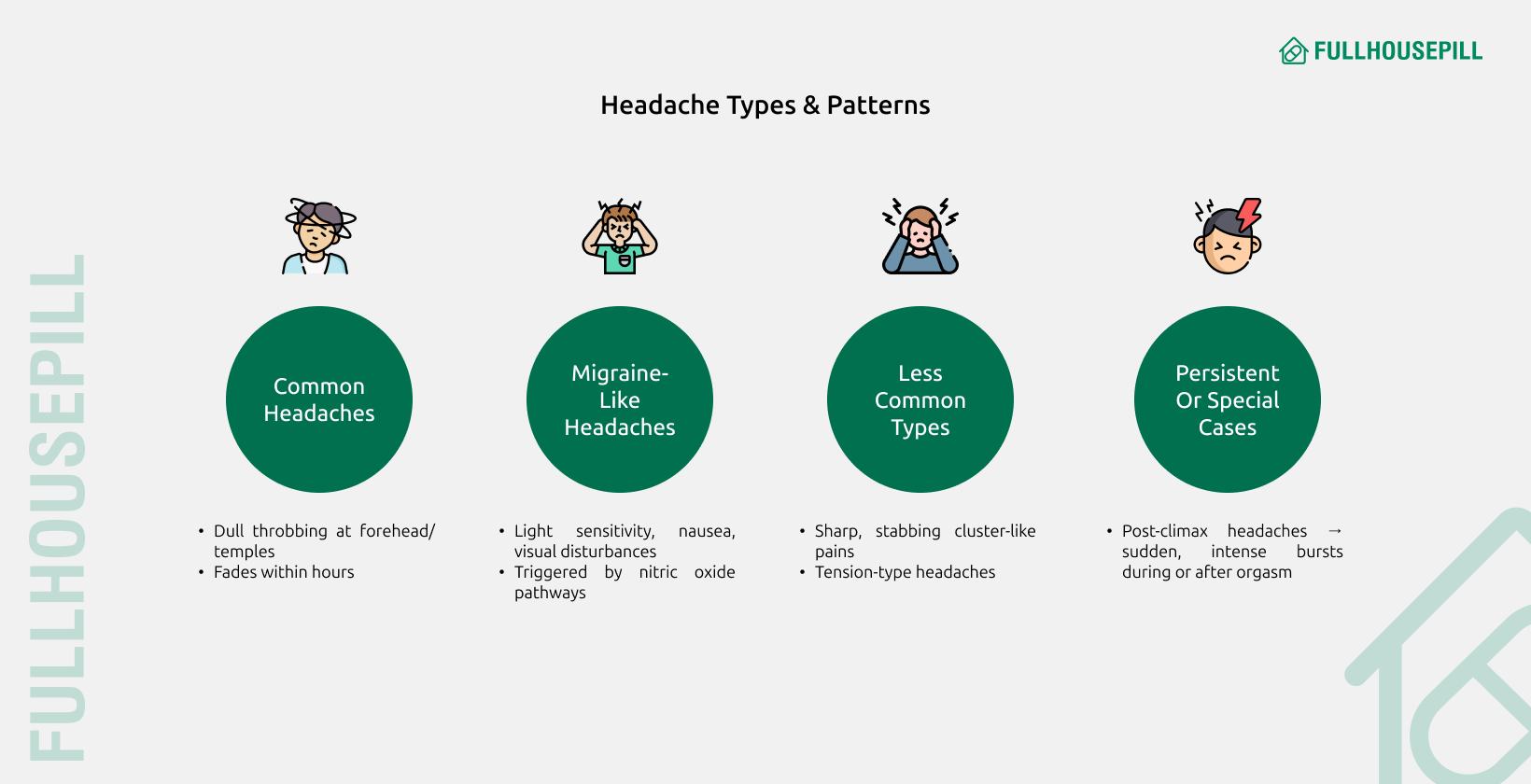
The types of headaches vary widely. Many men report a dull throbbing across the forehead or temples, which usually fades within a few hours. Others experience migraine-like pain, which comes with light sensitivity, nausea, or visual disturbance. This happens because ED medications trigger nitric oxide release, which is a known migraine pathway, as noted by The Journal of Headache and Pain. In some cases, men describe migraine-like or tension-type headaches, sharp, stabbing pains that recur several times in a single day. These are less common but can be very distressing.
Persistent or resistant headaches also occur. While most men recover once the medication wears off, a subset continues to feel lingering discomfort. Some cases involve post-climax headaches, according to The Lancet Neurology. These are sudden, intense bursts of pain that occur during or immediately after orgasm. They are linked to rapid changes in blood pressure and cerebral blood vessel tone. Although they are usually harmless, they can interfere with intimacy and cause anxiety in men who experience them repeatedly.
ED medication headaches are not rare. They range from mild tension-type pain to migraines and, in rare cases, cluster or post-climax headaches. The underlying cause is the same: blood vessel dilation triggered by nitric oxide and cGMP. This is a more complex process involving nitric oxide, cGMP pathways, trigeminal nerve activation, and potential peroxynitrite formation. CGRP release also contributes to vascular migraine mechanisms. For most men, the pain is temporary, but for others, it may become persistent or more complex depending on individual sensitivity and dosage.
How long do ED medications headaches last?
Headaches from erectile dysfunction medications usually last a few hours, but in some men, they can continue into the next day or return in cycles, depending on the drug and individual sensitivity. Sildenafil, better known as Viagra, stays active for about four to six hours, and the related headaches often match this time frame, according to the U.S. Food and Drug Administration. Vardenafil, sold as Levitra, has a similar profile, with most headaches fading before the end of the day. Tadalafil has a half-life of about 17.5 hours. This allows for a longer window of efficacy, up to 36 hours, as reported by the National Institute of Health. It can be a preferable option for patients seeking extended coverage and reduced headache intensity.
The type of headache also affects duration. A simple tension-like headache may pass within two or three hours. Migraines caused by nitric oxide pathways are harder to resolve. Nitric oxide is a well-known trigger for vascular migraines, and these can last 12 to 24 hours if untreated, according to The Journal of Headache and Pain. In rare cases, men experience migraine-like or tension-type headaches, short but extremely painful attacks that repeat several times across a few days. The Lancet Neurology notes that this pattern is tied to increased sensitivity of blood vessels in the brain.
There are also persistent or special cases. Some men develop resistant headaches that remain even after the drug has cleared the bloodstream. Others report post-climax headaches, a sudden burst of pain at orgasm. These headaches are linked to abrupt changes in blood pressure and vascular tone, according to Cephalalgia, the journal of the International Headache Society. They can last from 30 minutes to a few hours, and although usually harmless, they often worry patients who mistake them for more serious issues.
ED medication headaches usually last as long as the drug is active in the body. Viagra and Levitra headaches usually resolve within a few hours, while Cialis may produce discomfort that lingers into the next day. For a smaller group of men, migraines, cluster pain, or post-climax headaches can extend the duration well beyond the expected timeline.
What are the Remedies for ED medication-induced headaches?
Headaches from Viagra, Cialis, or Levitra can often be managed with simple remedies, including safe pain medications and small lifestyle adjustments.
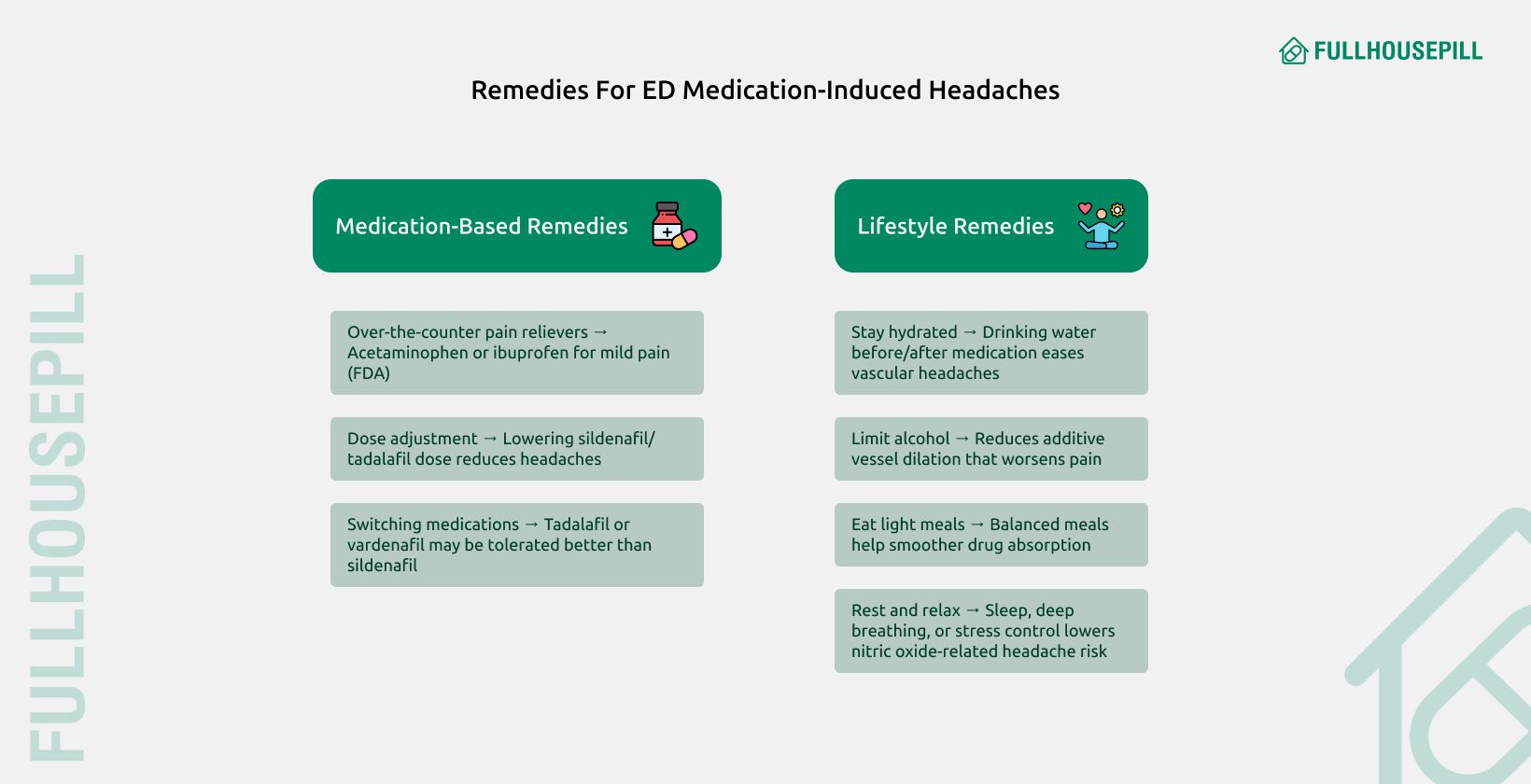
Medication-Based Remedies
Sometimes, medical support is the simplest way to ease ED drug headaches. A few safe pain relievers and dose adjustments can often make a big difference.
- Over-the-counter pain relievers – Mild headaches from PDE5 inhibitors respond well to drugs like acetaminophen or ibuprofen, according to the U.S. Food and Drug Administration. These are generally safe when used occasionally, but men with stomach, kidney, or heart conditions should consult a doctor first.
- Dose adjustment -Lowering the dose of sildenafil or tadalafil can reduce headache frequency without fully losing effectiveness. This was noted by clinical findings in the International Journal of Impotence Research.
- Switching medications – Some men tolerate one PDE5 inhibitor better than another. For example, men who get strong headaches from sildenafil may find tadalafil or vardenafil easier on the system.
Lifestyle Remedies
Lifestyle choices also play an important role. Small changes in hydration, diet, or alcohol use can reduce the intensity of headaches and improve overall comfort.
- Stay hydrated – Dehydration can worsen vascular headaches. Drinking water before and after taking ED medication can help reduce discomfort.
- Limit alcohol – Alcohol dilates blood vessels and can make drug-induced headaches worse. Avoiding or reducing alcohol use on days of medication may ease symptoms.
- Eat light meals – Heavy or greasy meals can slow absorption and increase side effects. A balanced meal may help the body process the drug more smoothly.
- Rest and relax – Sleep, rest, or stress-reduction techniques like deep breathing may ease vascular headaches. Stress is known to amplify nitric oxide-related pain.
Men should consult a doctor if headaches are severe, long-lasting, or resistant to over-the-counter treatments, as per the U.S. Food and Drug Administration. Persistent headaches may require switching drugs, adjusting the dose, or checking for other health conditions such as high blood pressure. Remedies for ED medication headaches include common painkillers, lowering the dose, switching to another drug, drinking water, limiting alcohol, eating light, and resting. Most men find relief with these steps, but ongoing or severe pain should always be discussed with a doctor.
Can You Take Viagra With Ibuprofen?
Yes, Viagra can generally be taken with ibuprofen because there are no direct drug interactions between the two. Sildenafil, the active ingredient in Viagra, does not interfere with nonsteroidal anti-inflammatory drugs (NSAIDs) like ibuprofen. This was reported by the U.S. Food and Drug Administration. Viagra works by increasing blood flow through the relaxation of blood vessels, while ibuprofen reduces pain and inflammation by lowering prostaglandin levels. Since these drugs act on completely different pathways, they are usually considered safe to use together.
Many men turn to ibuprofen to ease headaches caused by Viagra or Cialis. Mild to moderate headaches linked with PDE5 inhibitors can be effectively relieved with over-the-counter medications such as ibuprofen or acetaminophen, according to research published in the Journal of Clinical Pharmacology. This makes ibuprofen a practical option for men dealing with drug-induced headaches.
It is important to consider health conditions before combining the two. Long-term or high-dose use of ibuprofen may irritate the stomach, increase blood pressure, and affect kidney function. Since Viagra can also cause a mild drop in blood pressure, men with existing cardiovascular disease should be careful and consult a doctor if they plan to combine the two regularly. Some men may prefer alternatives. Acetaminophen is often gentler on the stomach compared to ibuprofen, though it should be used within safe limits to avoid liver damage. Acetaminophen is less likely to cause stomach irritation, making it a better choice for men prone to ulcers or digestive issues, according to Harvard Health.
Viagra and ibuprofen can be safely used together for most men, especially if taken occasionally to manage headaches. However, if you have heart disease, kidney problems, or stomach ulcers, it is safer to check with a doctor before combining them.
What are the Best Ways to Prevent Viagra Headaches?
The best ways to prevent a Viagra headache are by adjusting the dose, staying well hydrated, and avoiding alcohol, as these factors reduce blood vessel strain that triggers pain.
Headaches from Viagra happen because sildenafil widens blood vessels in both the penis and the brain. According to the National Institutes of Health, this vasodilation increases nitric oxide activity, which can overstimulate the nerves responsible for head pain. While this is a common and temporary side effect, prevention strategies can make a big difference.
One of the most effective steps is dose adjustment. Men who switched from higher doses of sildenafil (100 mg) to moderate doses (50 mg) reported fewer headaches without losing the drug’s effectiveness, as reported by a study in the International Journal of Impotence Research. Doctors often recommend starting with the lowest effective dose to balance benefits and side effects.
Hydration also matters. Dehydration makes blood vessels more sensitive, which can worsen headache intensity. Drinking water before and after taking Viagra helps reduce this sensitivity. Alcohol should also be avoided or minimised. It dilates blood vessels and lowers blood pressure, which adds to the same vascular stress that Viagra already causes. This combination increases the risk of headaches and dizziness.
Other preventive strategies include eating a light meal before the dose, since heavy fatty meals delay absorption and can make side effects stronger, and maintaining regular sleep, as lack of rest heightens vascular headaches.
The best way to prevent Viagra headaches is to use the lowest dose that works, drink plenty of water, skip alcohol, and keep your body balanced with food and rest. These steps reduce strain on blood vessels and make the medication easier to tolerate.
Are Cialis or Levitra Less Likely to Cause Headaches?
Yes, headaches are less common with Cialis and Levitra compared to Viagra. Although they can still occur because all three drugs work similarly. Headaches are linked to how strongly each PDE5 inhibitor affects blood vessels. Complex dose-response patterns for sildenafil headaches. In fixed-dose trials, headache rates were 14.4% at 50mg versus 12.2% at 100mg, while flexible-dose trials showed 12.8% at 50mg versus 8.8% at 100mg. Tadalafil (Cialis) and vardenafil (Levitra) cause headaches in a smaller percentage, as reported by the U.S. Food and Drug Administration. Men on daily Cialis (2.5-5 mg) experienced headaches in approximately 3-8% of cases, while on-demand Cialis (10-20 mg) showed rates of 10-17%. Levitra users reported headache rates of approximately 12-15%, which is comparable to or slightly lower than Viagra at equivalent doses. This was reported by the Journal of Sexual Medicine.
The difference lies in how these drugs act in the body. Viagra works quickly and produces a sharp increase in nitric oxide and blood flow, which can trigger stronger vascular reactions. Cialis, on the other hand, has a slower onset but lasts much longer in the system, which often makes the headache less intense, though sometimes more prolonged. Levitra tends to strike a balance, with fewer side effects while still maintaining strong effectiveness.
Men who switched from Viagra to either Cialis or Levitra often reported better tolerance, with headaches becoming less frequent or manageable, according to research in The International Journal of Impotence. Still, individual response varies, and what causes a headache in one man may not affect another. Cialis and Levitra are generally less likely to cause headaches than Viagra, but since all three widen blood vessels, the risk never fully disappears.
What Are The Other Side Effects of ED Medications Beyond Headaches?
ED medications like Viagra, Cialis, and Levitra cause more than just headaches. Common side effects include flushing, nasal congestion, indigestion, dizziness, and vision changes. Cialis is also linked to back pain and muscle aches, while rare but serious risks across all drugs include vision or hearing loss and priapism.
Most side effects are due to the same blood vessel-relaxing mechanism that helps these drugs work, according to FDA-approved safety data. Flushing and nasal congestion happen when blood vessels widen beyond the penis. Visual changes are linked to PDE6 enzyme interaction in the retina, while back pain with Cialis comes from PDE11 inhibition in muscles. These effects are usually mild and temporary, but can be bothersome in some men.
Headaches remain the single most frequent complaint, but there are ways to reduce them. The best prevention is dose adjustment. Using the lowest effective dose of sildenafil can lower the chance of vascular headaches. Staying well-hydrated, avoiding alcohol, and not mixing the pill with heavy or high-fat meals can also help. Some men benefit from taking mild pain relief like ibuprofen when needed. It does not interact dangerously with sildenafil as reported by clinical pharmacology data. For men who continue to struggle, switching to a longer-acting option like tadalafil may reduce headache frequency.
Beyond headaches, ED drugs can cause flushing, nasal stuffiness, and digestive issues, while Cialis may add back pain into the mix. The best way to prevent Viagra headaches is to use the right dose, keep hydrated, and avoid alcohol. In persistent cases, discussing an alternative medication with a doctor may be the safest solution.
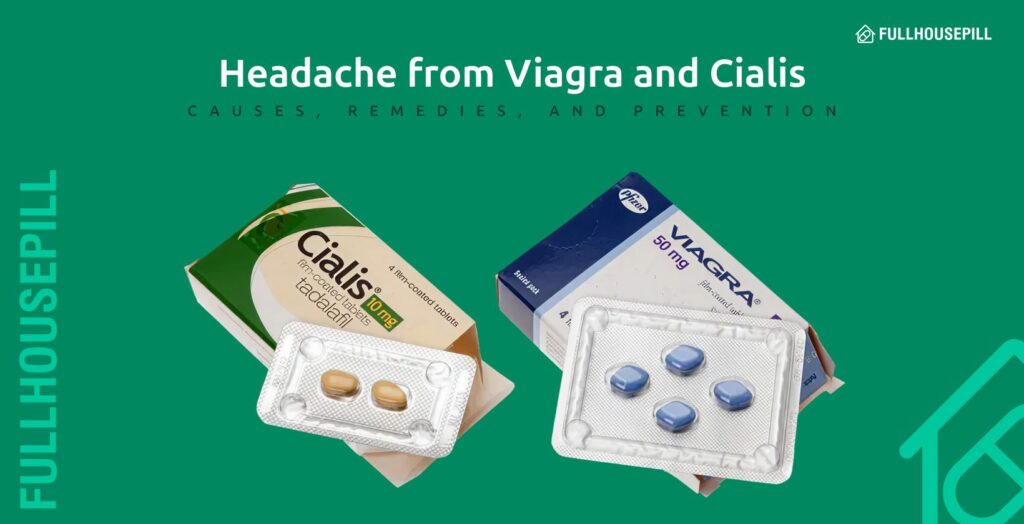
I am really impressed with your writing skills and also with the structure for your weblog. Is that this a paid subject or did you modify it yourself? Anyway stay up the excellent quality writing, it is uncommon to look a great blog like this one nowadays. !